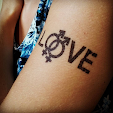Last year I gave you a rundown of all the novels I read that year. This year, however, I read 30 novels and have therefore decided to instead tell you about the five best novels I read this year and maybe about the five I liked the least.
1. Our Wives Under the Sea - Julia Armfield
A beautifully tragic love story in retrospect, Our Wives Under the Sea tells of a woman whose wife returns home after being lost on a deep sea mission for 6 months, as well as the wife's experience on the ocean floor. While lost, whatever Leah found in the darkness and deep, left her forever changed. Miri has to adapt to the new status quo and find that the process of grieving for the woman that embarked on her journey 6 months ago is far from over.
The novel is an elegy that can be read both as an allegory for terminal illness as well as a tale about the transformative nature of the ocean and how despite it all, the love we have for each other is all that counts. It is also just so gorgeously written with lyrical phrasing centering the emotions of the two women.
2. Convenience Store Woman - Sayaka Murata
Keiko Furukura is 36 years old, single and works in a convenience store in Tokyo. She is, by all accounts, content with her life and feels fulfilled in the minutiae of her job. Everyone around her, however, insists that there is something wrong with how she chooses to live her life, her coworkers, her friends, her family, and Keiko feels the omnipresent pressure to try and mold herself into a form they might accept.
When I read the novel I felt so charmed by the poetic description of the daily routine in the store (credit, too, here to Sayaka Murata's English translator Ginny Tapley Takemori) communicating so clearly that Keiko felt at peace there, a cog in a well-oiled machine, part of something bigger that matters to people. I also found myself deeply relating to her - ultimately fruitless - attempt to fit into what society expects of her and rejoicing at her realizing that above all she needs to stay true to herself.
3. A Psalm for the Wild-Built - Becky Chambers
It is not surprising that a Becky Chambers novel would land on my top 5; she is, after all, one of my favorite authors. This novel is a meditation on themes of purpose and usefulness and identity. In a solar punk future that came centuries after a destructive industrial age which ended when the newly sentient robots left humanity to walk into the wilderness of the moon they live on, a monk called Dex in search of the meaning of life leaves the outskirts of civilization and becomes the first to run into a robot.
The novel is beautiful, soft and gentle. Just like Dex helps people with teas and lending an ear, this novel takes your hand through feelings of purposelessness and inadequacy. As in her Wayfarer series, the worldbuilding here is intricate and gives us a glimpse into a possible world where humanity lives in tandem with nature and hope is thriving.
4. Gingerbread - Helen Oyeyemi
This was one of the last novels I read this year and I adored it. A woman is forced to confront her past when her daughter almost dies. She has to grapple with her childhood in a country that for all intents and purposes does not exist and her relationships to her mother and the family responsible for her leaving the country of her birth.
I was immediately drawn in by the dreamy prose that gives the world, especially the non-existent country but also the present in England, a fairytale feel, with all the whimsy and uncanniness that implies. Harriet and her struggles, anxieties, hopes and dreams, felt solid and real to me and I loved exploring what made her who she is in themes of belonging, legacy and origin.
5. Assembly - Natasha Brown
The narrator of this tour de force of a novel is an ostensibly successful Black British woman. She has made it in a predominantly white patriarchal corporate world. A promotion is on the horizon and her rich white boyfriend just invited her to family garden party. As she preaches to young girls that they, too, can get where she is, she feels her world to be a constant struggle and her 'dream' a lie, the success nothing more than a cage society's systems keep her in. When she receives a life-changing medical diagnosis, her inner turmoil reaches a breaking point.
The visceral and inventive writing style does not sugarcoat exactly how trapped the narrator feels and makes the reader feel with her. The issues discussed - racism, sexism, classism and sexual harassment - are portrayed so real and inescapable, you understand how she comes to the decision she makes in the end.






